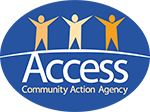HOMELESSNESS PREVENTION SERVICES ARE HOUSING PROGRAMS FOR THE HOMELESS, OR IN JEOPARDY OF BEING HOMELESS, INDIVIDUALS AND FAMILIES.
ELIGIBILITY & APPLYING
This program is for: Families and Single Adults
More information about enrolling in this program:
All referrals to this program come through the Coordinated Access Network (CAN) and families and individuals must enter the CAN system via calling 2-1-1.
MAIN PROGRAM CONTACT
(860) 412-1600 ext. 1623
